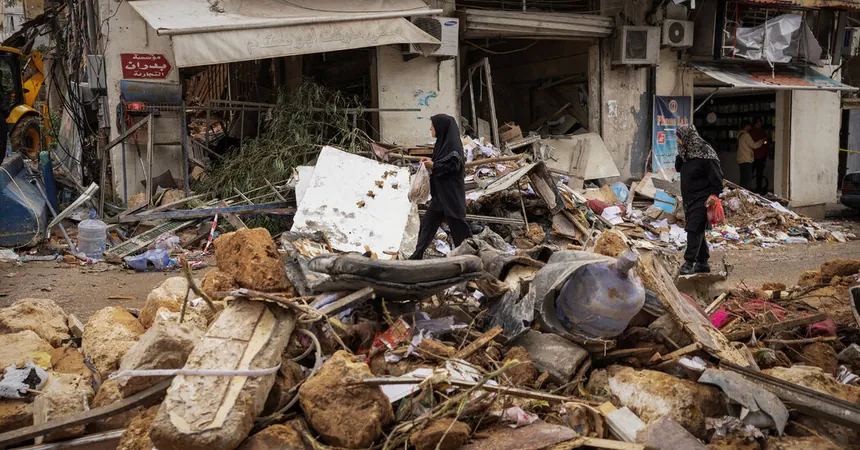
U.S. Diplomatic Efforts Intensify for Israel-Hezbollah Ceasefire Amid Escalating Violence
2024-11-19
Author: Lok
U.S. Diplomatic Moves in Lebanon
In a significant diplomatic move, Amos Hochstein, the U.S. envoy to the Middle East, visited Lebanon this Tuesday, expressing optimism about a potential cease-fire between Israel and Hezbollah. As the region grapples with the repercussions of Israel’s ongoing war in Gaza, Hochstein indicated that the negotiating parties are edging closer to reaching an agreement that could bring much-needed relief to the area.
Hochstein's Press Conference
During a press conference in Beirut, Hochstein revealed, 'We have a real opportunity to bring this conflict to an end,' emphasizing that progress is now within reach. His remarks were bolstered by high-level meetings, including discussions with Nabih Berri, the Lebanese Parliament speaker and a vital mediator with Hezbollah, which has escalated its military actions against Israel.
Iran's Position
Adding to the complexity, Iran's Supreme Leader, Ayatollah Ali Khamenei, recently hinted at supporting a cease-fire, instructing a top advisor to advocate for such a resolution in conversations with Hezbollah. 'It’s crucial for Hezbollah to consider a cessation of hostilities,' insiders from Iran’s Revolutionary Guards Corps stated, alluding to the delicate diplomatic ballet between these regional players.
Challenges in Negotiation
Despite Hochstein’s hopeful tone, the discussions remain fraught with challenges. Previous attempts to broker a cease-fire saw negotiations falter as violence intensified. Lebanese officials received a proposed cease-fire plan from the U.S. and Israel last week, which they deemed 'positive' but not without its hurdles. Caretaker Prime Minister Najib Mikati remarked that critical details still require negotiation.
Lebanon's Political Struggles
The backdrop to these negotiations is Lebanon's struggling government, which is working to revive a United Nations resolution from 2006 that purportedly ended hostilities between Israel and Hezbollah. The effectiveness of this resolution, aimed at establishing a peacekeeping presence in southern Lebanon, has been called into question in recent years. Hezbollah's proposed withdrawal from this region raises concerns about potential enforcement, given that both Lebanese military and U.N. peacekeepers have historically shied away from confronting Hezbollah fighters.
Recent Attacks on U.N. Personnel
In a related development, Jean-Pierre Lacroix, a high-ranking U.N. official overseeing peacekeeping forces in Lebanon, reported multiple attacks on U.N. personnel, underscoring the volatile environment within the region. This week alone, three separate incidents targeted U.N. forces, resulting in property damage but fortunately no casualties among the peacekeepers.
Hezbollah's Response
Hezbollah's current stance appears uncompromising, particularly as Israeli military operations escalate. In a recent wave of airstrikes, Israeli forces targeted alleged Hezbollah positions, including strikes within Beirut itself, reportedly killing at least five civilians and injuring dozens more. Analysts believe these aggressive tactics aim to bring Hezbollah to the negotiating table, driving them toward acceptance of the cease-fire proposals.
Public Sentiment in Lebanon
Nevertheless, the general sentiment among Lebanese citizens remains one of deep skepticism. As they navigate a fractured reality marred by violence, individuals like Zeinab Atwi voice their despair. Following the deadly airstrikes that claimed the life of her cousin, she lamented, 'There is nowhere safe left in Beirut,' illustrating the pervasive uncertainty and fear rippling through the community.
International Community's Watch
As U.S. efforts to mediate continue, the stakes are higher than ever, with the international community on edge, awaiting the results of these crucial negotiations. Will a lasting peace be possible, or are the hopes for a cease-fire merely a fleeting dream? The world watches closely as tension in the region escalates further.



 Brasil (PT)
Brasil (PT)
 Canada (EN)
Canada (EN)
 Chile (ES)
Chile (ES)
 España (ES)
España (ES)
 France (FR)
France (FR)
 Hong Kong (EN)
Hong Kong (EN)
 Italia (IT)
Italia (IT)
 日本 (JA)
日本 (JA)
 Magyarország (HU)
Magyarország (HU)
 Norge (NO)
Norge (NO)
 Polska (PL)
Polska (PL)
 Schweiz (DE)
Schweiz (DE)
 Singapore (EN)
Singapore (EN)
 Sverige (SV)
Sverige (SV)
 Suomi (FI)
Suomi (FI)
 Türkiye (TR)
Türkiye (TR)